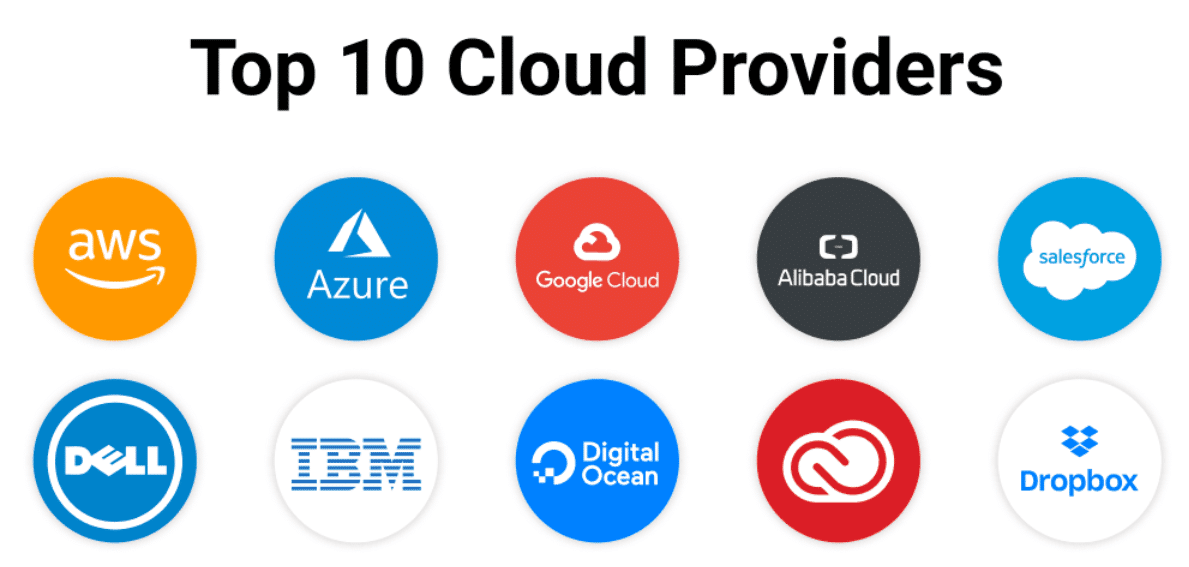Top Cloud Servers – The demand for reliable, secure, and scalable cloud infrastructure has never been greater. As businesses migrate from traditional servers to cloud-based environments, selecting the top cloud server becomes a strategic decision that influences everything from performance and security to collaboration and cost-efficiency.
In this comprehensive guide, we will explore the concept of cloud servers, analyze the top cloud server providers in 2025, and provide insight into what makes each one unique. Whether you’re an entrepreneur, IT professional, or enterprise decision-maker, this article is designed to help you make an informed choice.

What is a Cloud Server?
A cloud server is a virtual server that runs on a cloud computing environment, delivering computing power, storage, and networking over the internet. Unlike traditional physical servers, cloud servers are hosted in remote data centers and can be accessed globally through secure connections.
They offer several advantages:
-
Scalability: Add or reduce resources as needed.
-
Flexibility: Customize configurations based on your applications.
-
Cost-efficiency: Pay only for what you use.
-
High availability: Data is stored redundantly across multiple locations.
Cloud servers are used to host websites, run applications, store data, and power entire business infrastructures.
Why Choosing the Right Cloud Server Matters
With hundreds of providers available, the cloud computing landscape can be overwhelming. However, the right provider can give your business:
-
Improved performance with lower latency
-
Better security and compliance
-
Reduced downtime and risk of failure
-
Greater agility to adapt to business growth
-
Access to advanced technologies like AI, big data, and machine learning
Making a well-informed decision ensures that your cloud strategy aligns with your short-term goals and long-term vision.
Top Cloud Server Providers in 2025
Below is a curated list of the most trusted and high-performing cloud server providers this year, based on factors like reliability, features, scalability, and global reach.
1. Amazon Web Services (AWS)
Overview: AWS remains the undisputed leader in cloud services. With a global network of data centers and a vast selection of tools, AWS is the go-to choice for startups, enterprises, and governments alike.
Key Features:
-
EC2 for virtual server hosting
-
Elastic Load Balancing
-
S3 for scalable storage
-
RDS for managed databases
Why It’s a Top Cloud Server:
-
Over 200 fully featured services
-
Highly secure infrastructure
-
Advanced analytics, AI, and ML tools
-
Pay-as-you-go and reserved instance pricing
Ideal For: Enterprises, SaaS companies, and organizations needing highly scalable infrastructure.
2. Microsoft Azure
Overview: Azure continues to grow rapidly, supported by its seamless integration with Microsoft’s software ecosystem and strong enterprise focus.
Key Features:
-
Virtual Machines and Azure Kubernetes Service
-
Azure Active Directory for identity management
-
Azure Blob Storage and Cosmos DB
-
Compliance across industries and regions
Why It’s a Top Cloud Server:
-
Trusted by 95% of Fortune 500 companies
-
Outstanding hybrid cloud capabilities
-
Deep integration with Office 365 and Windows Server
Ideal For: Businesses already using Microsoft products or needing hybrid cloud deployments.
3. Google Cloud Platform (GCP)
Overview: GCP shines in data analytics, AI, and high-performance computing. It’s particularly popular among developers and tech startups.
Key Features:
-
Compute Engine and App Engine
-
BigQuery for real-time data analytics
-
Cloud Functions and Kubernetes Engine
-
Seamless AI integration via Vertex AI
Why It’s a Top Cloud Server:
-
User-friendly developer tools
-
Competitive pricing and billing transparency
-
Exceptional support for containerization
Ideal For: Data-intensive businesses, AI/ML projects, and software developers.
4. IBM Cloud
Overview: IBM Cloud blends traditional enterprise systems with cutting-edge cloud solutions. Known for strong compliance and AI capabilities through Watson.
Key Features:
-
Bare metal and virtual servers
-
Watson AI and machine learning
-
Cloud Object Storage
-
Blockchain and IoT services
Why It’s a Top Cloud Server:
-
Excellent for mission-critical enterprise workloads
-
Industry-specific cloud environments
-
High-level encryption and security options
Ideal For: Financial services, healthcare, and large organizations with strict regulatory needs.
5. Oracle Cloud Infrastructure (OCI)
Overview: OCI has emerged as a serious competitor in high-performance and database-centric workloads, especially for businesses using Oracle products.
Key Features:
-
Autonomous Database
-
FastConnect and Oracle Integration Cloud
-
Bare metal compute and GPU instances
-
Analytics, AI, and business insights
Why It’s a Top Cloud Server:
-
Optimized for high-performance Oracle apps
-
Transparent and competitive pricing
-
Security-first architecture
Ideal For: Enterprises that rely on Oracle databases and want deep integration.
6. DigitalOcean
Overview: DigitalOcean focuses on simplicity and ease of use. It’s a favorite among developers, startups, and small businesses looking for affordable, reliable cloud hosting.
Key Features:
-
Droplets (virtual machines)
-
App Platform for PaaS
-
Managed Kubernetes and databases
-
Flat-rate, transparent pricing
Why It’s a Top Cloud Server:
-
Clean, user-friendly dashboard
-
Strong developer community
-
Cost-effective for smaller workloads
Ideal For: Developers, freelancers, agencies, and SMBs.
7. Linode (by Akamai)
Overview: Linode offers powerful, straightforward cloud computing backed by Akamai’s global network. It’s a cost-efficient alternative to the big players.
Key Features:
-
SSD-powered virtual machines
-
Global data centers
-
Flat-rate pricing and DDoS protection
-
Managed services and block storage
Why It’s a Top Cloud Server:
-
Excellent price-performance ratio
-
Easy setup for developers
-
Transparent billing
Ideal For: Tech enthusiasts, developers, and budget-conscious businesses.
8. Alibaba Cloud
Overview: Asia’s leading cloud provider with a rapidly growing presence worldwide, Alibaba Cloud is known for its scalability and local market strength.
Key Features:
-
Elastic Compute Service (ECS)
-
ApsaraDB and Object Storage Service (OSS)
-
AI, security, and IoT support
-
Localized compliance in Asia-Pacific
Why It’s a Top Cloud Server:
-
Dominates Asian markets
-
Strong e-commerce and logistics integrations
-
Fast, scalable cloud infrastructure
Ideal For: Businesses expanding into China or Southeast Asia.
How to Choose the Right Cloud Server for You
With so many excellent options, here are a few criteria to help narrow your selection:
1. Business Size and Budget
Small businesses might prioritize simplicity and pricing (DigitalOcean, Linode), while enterprises will value scalability and compliance (AWS, Azure).
2. Use Case
Need big data analytics? Go for GCP. Running Oracle workloads? Choose OCI. Hosting a web app? Consider DigitalOcean or AWS.
3. Global Presence
If your customers are worldwide, opt for providers with broad data center coverage for lower latency and better performance.
4. Support and SLA
Check the quality of customer service, community support, and service level agreements (SLAs). Some providers offer 99.999% uptime guarantees.
5. Security and Compliance
Industries like finance or healthcare must ensure the provider complies with GDPR, HIPAA, or SOC standards and offers tools like MFA, encryption, and DDoS protection.
Cloud Server Trends in 2025
The cloud ecosystem is evolving rapidly. Key trends shaping the industry include:
-
Serverless computing: More businesses are embracing serverless models like AWS Lambda and Google Cloud Functions for cost-efficiency.
-
AI-native infrastructure: Providers are integrating AI for monitoring, scaling, and predictive maintenance.
-
Sustainability: Green data centers and carbon-neutral cloud computing are gaining popularity.
-
Edge computing: Decentralized data processing at the network edge is enhancing speed for IoT and 5G applications.
-
Zero-trust security: Next-gen cloud servers are embedding identity-based, zero-trust architectures by default.
Conclusion
Choosing a top cloud server isn’t just about performance or pricing—it’s about aligning with a provider that understands your needs, protects your data, and empowers your growth. Whether you go with AWS for its unmatched scale, GCP for analytics, or Linode for affordability, the best cloud server is the one that fits your goals and vision for the future.
As technology continues to evolve, embracing the cloud is no longer optional—it’s essential. The providers listed above are leading the charge, enabling businesses large and small to thrive in the digital age.
